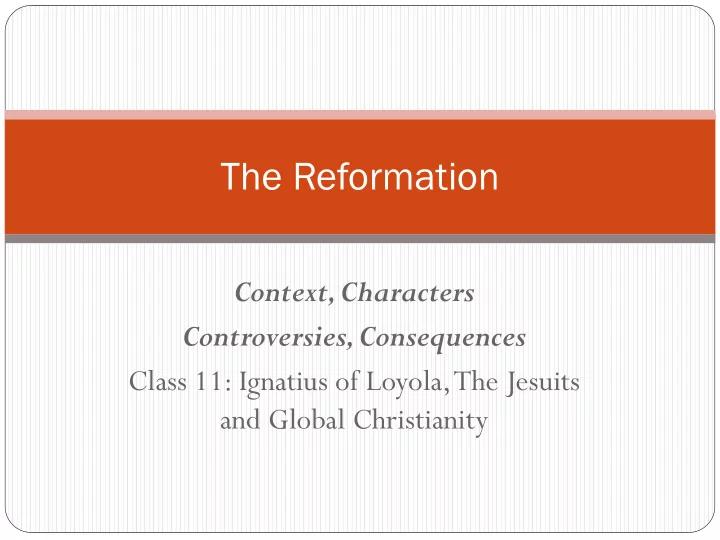

The Reformation Context, Characters Controversies, Consequences Class 11: Ignatius of Loyola, The Jesuits and Global Christianity
Errata Apology for typos in last week’s materials John Wycliffe – Died of a stroke in 1384 Declared a heretic in 1415 – body exhumed and burned.
Class 11 Goals Explore Saint Ignatius of Loyola and his legacy within the Catholic Church. Look at the formation of the Jesuits and their role in the global missionary movement. Examine the contested legacy of the Jesuits and their role in European Imperialism.
Opening Question Is a major missionary endeavor to convert the rest of the world a good thing, even if it is not led by Protestants? Consider Luke 9:50 “for whoever is not against you is for you.” and Luke 11:23 “Whoever is not with me is against me .”
Ignatius of Loyola – Early Life Raised as the youngest son in a Basque noble family. Reputed to have had a wild early life. At 30 he volunteered to defend Pamplona against an invading French army. His leg was shattered by a cannonball – requiring painful convalescence and ending his career as a knight. Began reading devotional works. He believed God called him to become a spiritual knight and defend the church.
Knight for God March 1522 – Loyola offered his sword to the Virgin Mary, exchanged clothes with a beggar, and started a pilgrimage to Jerusalem. Stopped by a plague outbreak he spent almost a year in a cave on an ascetic retreat: Intense Prayer, extreme mortification, rigorous introspection. Began writing the Spiritual Exercises. 1. Systematic consideration of sin and consequences 2. Significance of life and Kingdom of Christ 3. The Passion Story 4. Reflection on risen and glorified Christ.
Individual Transformation Reformation through personal change – not institutional or theological modification. Master individual will. Focused development of virtues or attacks on vices. Would these types of exercises be valuable for Protestants?
The Jesuits 1537 – Loyola and companions swore a medieval oath to travel to Jerusalem and convert Muslims. Prevented by war. In 1540 the Jesuits were recognized by Pope Paul III Emphasized active life in the world – not retreat and contemplation. 4 Vows – poverty, chastity, obedience to the Pope and missions “If we wish to proceed securely in all things, we must hold fast the following principle: What seems to me white, I will believe black, if the hierarchical church so defines. For I must be convinced that in Christ our Lord, the bridegroom, and in his spouse, the church, only one Spirit holds sway, which governs and rules for the salvation of souls.” Loyola Spiritual Exercises
Importance of Education Loyola established grammar schools and the Roman College and German College in Rome. Schools were used to train the next generation of scholars and Jesuits. By 1556 1,000 Jesuits By 1626 15,000 Jesuits and 440 colleges. In the United States today: Boston College, Holy Cross, Fordham, Georgetown, Loyola, Marquette, Xavier etc.
Considering a Source Should we consider Jesuits co-laborers for the Gospel? Consider the following historical account: Eunice Williams had been captured in a raid on Deerfield in 1704 – adopted into Native family in Canada – and (forcibly?) converted to Catholicism. Eleazar Williams (1787-1858) Raised among the Mohawk – son of captive descendants. Educated at Dartmouth, became a Protestant Missionary. Wrote an account of his great grandmother’s captivity. Underlying theme: blame the Jesuits not the Mohawks
Missionary Orders Augustinians – Martin Luther’s Order – focus on strict observance of Gospel Message Sent Missionaries to Mexico, Peru, Columbia, Chile, India, China, Japan, Philippines, Kenya, and Arabia Dominicans – Tradition of teaching and theology Especially important for missions in the New World. Bartolomé de Las Casas and others taught that Native Americans were human and deserved more respect.
Francis Xavier Led Missionary Journeys to: India – began by instructing lapsed Portuguese settlers. 3 years preaching in Sothern India, founded 40 churches. Japan – Xavier the first western Missionary – used Japanese words and concepts for God. Converted up to 30,000. Realized the contrast of embedding evangelism in colonial exploitation, but still some cultural insensitivity.
Voyages of Francis Xavier
Saint Matteo Ricci (1552-1610) Started with 4 year mission in India (1578-1582) On Maccau mastered Chinese Script and Classical Chinese Lived for six years in Zaoqing and created a western map of China and Chinese Portuguese Dictionary 1601 became an advisor to the emperor based on his scientific skills and converted a number of top Chinese officials. Borrowed Confucian Concepts to explain Christianity – his approach was later outlawed by Pope.
St. Jean de Brébeuf Converted large numbers of Hurons to Christianity. Ordered his subordinates to adopt the Native American Lifestyle. Within a lodge of broken bark The tender Babe was found, A ragged robe of rabbit skin Enwrapped His beauty round. Captured, tortured, and killed with eight other Jesuits.
The Jesuit Relations Account of Missionary Activities in Canada. Published from 1635-1673. Provides important ethnographical information about Native Americans. Also designed as a fund raising tool and an adventure story.
Backlash Gradually European and Colonial States kicked the Jesuits out of their territories. Many people viewed them as political schemers and economic exploiters. Royal officials resented their loyalty to the Pope. 1759 – banned from Portugal. 1764 – banned from France and French territories. 1767 – banned from Spain and their colonies. Restored after the Napoleonic Wars – 1815.
Discussion Questions How do we evaluate the positive and negative legacies of missionary activity during this time period? How much cultural accommodation of the Gospel is too much? What questions would you like addressed next week?
Next Week Wrap up – conclusions and The Joy of the Gospel
Recommend
More recommend